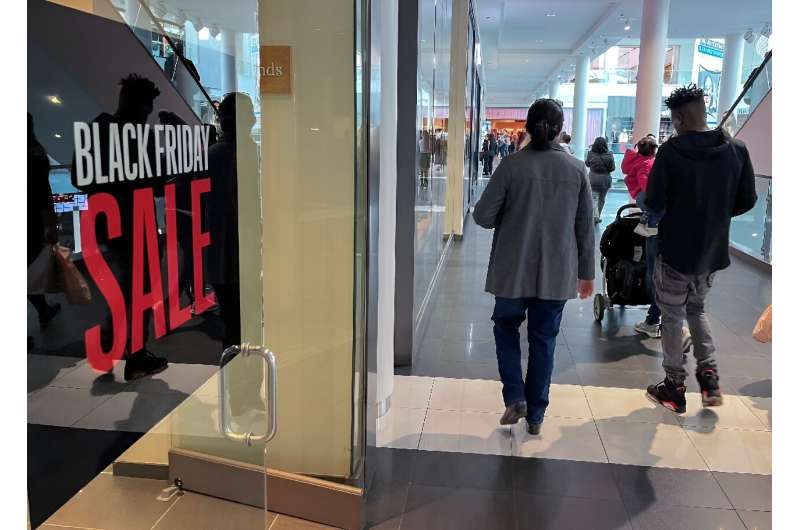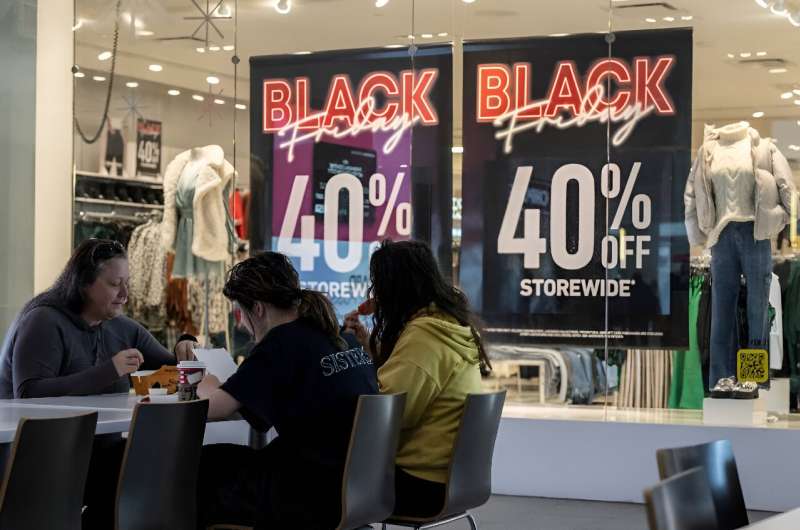This article has been reviewed according to Science X's editorial process and policies. Editors have highlighted the following attributes while ensuring the content's credibility:
fact-checked
reputable news agency
proofread
US economic uncertainty means bigger 'Black Friday' discounts

Retailers' efforts to attract holiday gift buyers build to a crescendo this weekend as the "Black Friday" shopping day kicked off with big discounts.
The major sales day after Thanksgiving, a custom increasingly adopted in Europe and other markets, comes amid lingering unease over the economy this year.
As a result, markdowns are expected to be especially deep, reflecting the pressure stores are under to lure US consumers jaded by still-high inflation for some goods and lingering effects from COVID-19 upheaval.
"Black Friday" will be followed by the newer "Cyber Monday," as the sector seeks to entice bargain-hunters.
On Friday, crowds swarmed through the doors of the Macy's department store in Manhattan when it opened at 6am (1100 GMT) after a symbolic countdown.
Consumers said they were not only looking for deals but happy to soak up the festive atmosphere.
"It's Black Friday, and there's great sales. And there's no place better than Manhattan to go shopping at Christmas time," said shopper Sandee Foster, 74.
Another customer, Cristina Carradero, 30, said it was a tradition to go Black Friday shopping with her mother.
Carradero, who is from Puerto Rico, added, "We're just having, like, a different kind of version here in New York."
But e-commerce giant Amazon was hit by strikes at various locations in Britain, Germany and Italy during the annual shopping extravaganza, as workers demand higher wages and better conditions.
Heavy traffic
Forecasters expect heavy consumer traffic, with the National Retail Federation (NRF) predicting more than 182 million consumers will shop in stores and online over the weekend.
That turnout—equal to more than half the US population—would top last year's level by 16 million and constitute a record since the trade group began tracking the period in 2017.
While Black Friday itself remains crucial, stores have been offering deals for weeks, marketing Black Friday sales earlier and earlier in October.
The bargains reflect hyper competition among retailers trying to win over consumers inundated with offers in digital spaces.
"Consumers will not sit out, but they will spend less," said Randy Allen, senior lecturer at Cornell University's SC Johnson College of Business.

"Retailers are concerned," Allen added.
Some shoppers will hold off on major purchases until closer to Christmas.
For those fixated on snagging the best deals, "it likely pays to hit the snooze button," advised a Wall Street Journal article. It cited experts who recommended waiting until December for bigger markdowns.
Picky consumers
Especially hot items this holiday season include mainstays such as Lego and Hot Wheels, along with Barbie, which is still basking in the afterglow of this summer's blockbuster movie.
Game consoles remain in demand, along with Meta Quest 3, a virtual reality headset, new iPhones and tablets.
With lingering inflation for groceries and other staples, many shoppers will buy items only if they are on sale.
"The shopper will be looking for items they really want and need, rather than simply buying lots of things on impulse," said Neil Saunders, managing director of GlobalData. "That's not necessarily a good thing for retailers."
Saunders said retailers "are carefully targeting discounts to certain items" instead of "having a promotional free-for-all."
Economic pundits have worried for months that the US economy could slip into recession. Instead, commentators have repeatedly been impressed by the resilience of US consumers.
Higher interest costs
The NRF has projected overall holiday sales growth of between three and four percent, which would mark a return to the pre-pandemic trend of more modest increases.
While inflation has slowed from a year ago, interest rates remain at their highest level in some 22 years following a string of rate hikes by the Federal Reserve. That can lead to punishing interest costs if consumers don't pay off their credit cards.
Households have less excess cash compared with a year ago following pandemic relief programs. Also those with student loans are back on the hook for interest payments after a moratorium expired.
While consumers have been bolstered by a strong job market that has kept unemployment under four percent, Allen pointed to recent layoffs and meager bonuses in some high-paying industries.
These include consulting, banking and technology, "masking" vulnerabilities and potentially weighing on sales.
© 2023 AFP





















